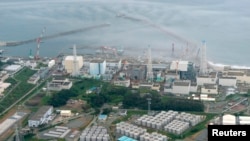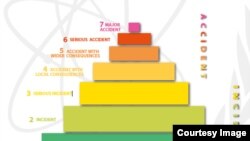Japanese nuclear regulators are expressing heightened concern about a fresh leak of radioactive water discovered this week at the troubled Fukushima nuclear power plant.
The Nuclear Regulation Authority said Wednesday it plans to raise its alert level from a level one "anomaly" to a level three "serious incident" on an international scale for radiation leaks. The scale goes from zero to seven, with seven being the most serious.
The Tokyo Electric Power Company said Tuesday at least 300 tons of radioactive water leaked from a steel storage tank at the coastal plant. It is one of hundreds of such tanks holding toxic water used to cool melted reactors.
TEPCO, the plant's operator, has not located the exact source of the leak. But it insists radiation levels outside the facility have not changed and says no water has reached the Pacific Ocean, which is only about 100 meters away.
The storage tanks have sprung leaks previously, but operators say this is by far the worst case. It has raised questions about the reliability of the tanks used to secure toxic reactor cooling water, which is accumulating at a rate of 400 tons a day.
TEPCO has already acknowledged that large amounts of radioactive groundwater have been seeping into the sea.
Richard Broinowski, a former Australian diplomat to Japan, says it is extremely concerning that TEPCO has failed to stop the radioactive leaks, nearly 30 months after the nuclear disaster.
"This is not a new event. It's an ongoing event. It keeps happening," he said. "Frankly, water has been leaking into the ocean ever since the earthquake and tsunami occurred."
The Japanese government recently stepped up its role in helping TEPCO clean up the plant. But Broinowski, who authored the book Fallout from Fukushima, says even with the government intervention, there is no end in sight to the leakages.
TEPCO has been running out of room to store radioactive water used to cool the reactors, which melted down following a massive earthquake and tsunami in March 2011 that shut off the plant's power and cooling systems.
It was the world's worst nuclear disaster since the 1986 Chernobyl accident in the Soviet Union. No one is reported to have died as a direct result of the Fukushima disaster, though tens of thousands are unable to return to their homes surrounding the facility.
Chernobyl and Fukushima are the only two disasters ever classified as a level seven on the nuclear crisis scale.
Japanese officials must first consult with United Nations nuclear regulatory agency before deciding to raise the rating of the most recent leak to level three on the scale.
The Nuclear Regulation Authority said Wednesday it plans to raise its alert level from a level one "anomaly" to a level three "serious incident" on an international scale for radiation leaks. The scale goes from zero to seven, with seven being the most serious.
The Tokyo Electric Power Company said Tuesday at least 300 tons of radioactive water leaked from a steel storage tank at the coastal plant. It is one of hundreds of such tanks holding toxic water used to cool melted reactors.
TEPCO, the plant's operator, has not located the exact source of the leak. But it insists radiation levels outside the facility have not changed and says no water has reached the Pacific Ocean, which is only about 100 meters away.
The storage tanks have sprung leaks previously, but operators say this is by far the worst case. It has raised questions about the reliability of the tanks used to secure toxic reactor cooling water, which is accumulating at a rate of 400 tons a day.
TEPCO has already acknowledged that large amounts of radioactive groundwater have been seeping into the sea.
Richard Broinowski, a former Australian diplomat to Japan, says it is extremely concerning that TEPCO has failed to stop the radioactive leaks, nearly 30 months after the nuclear disaster.
"This is not a new event. It's an ongoing event. It keeps happening," he said. "Frankly, water has been leaking into the ocean ever since the earthquake and tsunami occurred."
The Japanese government recently stepped up its role in helping TEPCO clean up the plant. But Broinowski, who authored the book Fallout from Fukushima, says even with the government intervention, there is no end in sight to the leakages.
TEPCO has been running out of room to store radioactive water used to cool the reactors, which melted down following a massive earthquake and tsunami in March 2011 that shut off the plant's power and cooling systems.
It was the world's worst nuclear disaster since the 1986 Chernobyl accident in the Soviet Union. No one is reported to have died as a direct result of the Fukushima disaster, though tens of thousands are unable to return to their homes surrounding the facility.
Chernobyl and Fukushima are the only two disasters ever classified as a level seven on the nuclear crisis scale.
Japanese officials must first consult with United Nations nuclear regulatory agency before deciding to raise the rating of the most recent leak to level three on the scale.






